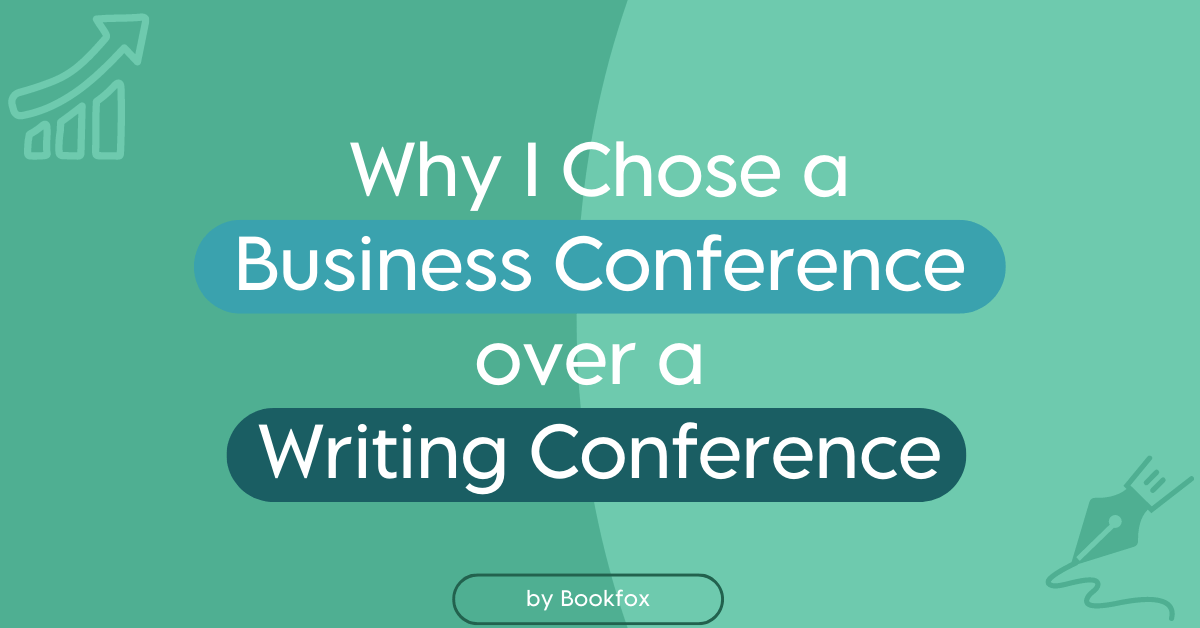
 As a writer, I’ve attended my fair share of writing conferences: AWP (many times), Bookexpo, Squaw Valley Writers’ Conference, and many more.
As a writer, I’ve attended my fair share of writing conferences: AWP (many times), Bookexpo, Squaw Valley Writers’ Conference, and many more.
So this year I decided to attend a business conference instead, and it was a wise decision. I attended the GO Summit by Fastermind, an intimate, 100-person conference, and it was revolutionary.
In fact, I think all writers should go to a business conference.
Here’s why:
Writers are essentially entrepreneurs. Virtually every writer I know has all the hallmarks of an entrepreneur:
- Makes their living from multiple income sources
- No writers make all their money from books. Most writers teach. Most writers write freelance articles. Writers get paid for writing reviews, for speaking appearances; they get paid for editing, for blogging. They scrabble together an income from multiple sources.
- How do you find new income sources? How do you decide which income source to prioritize and which one to abandon? Those are questions that properly belong in the realm of business, not in the realm of the literary. Now I’m full-blooded literary, through and through. But I can recognize when another industry has wisdom that I need.
- Is building a one-of-a-kind product that they are selling in a marketplace.
- Yes, I know that’s business lingo. Bear with me. If you write a book about a poor blind girl trying to find a jewel in the WWII era, you’re going to be blown out of the water by Anthony Doerr’s novel “All the Light We Cannot See.”
- My point is that you have to make something original. And it is a marketplace. People either buy your book or buy a movie ticket to watch the new Jason Bourne/Mission Impossible/Iron Man movie. Your job is to make them want your book.
- Can create anything they can imagine (and has no boss to distort their creation)
- The sky is the limit (That’s a cliche. Avoid those). But you understand that what you do as a writer is only limited by your imagination.
Now, I can already hear your rejections from here.
Maybe you’re one of the types that hates the language of business (all that jargon).
Maybe you want to do art in a pure form, and hate the commercialization of the industry.
Maybe you recognize that business affairs aren’t your strength, and you want to stick with what you know (words! words! words!).
I hear all that. I hear your objections and still insist that you at least educate yourself to a small degree. Because here’s the truth: if you ignore the business side of books, you are not preserving some kind of perfect sanctuary where art will thrive and commerce will never invade.
What you’re doing is ensuring that everyone else will make money off your book while you remain penniless.
Think about it: virtually everyone in the book industry makes a living from working with books.
- Agents. Make a good living.
- Editors. Make a good living.
- Publishers. Make a good living.
- Marketers. Make a good living.
And writers? Writers are the poorest bunch of the lot. Half of self-published authors earn less than $500 per book.
You might think that traditionally published authors are doing much better, because you hear about six-figure advances and have a friend of a friend who got a $15,000 advance for a book you didn’t think was very good, but you would be wrong.
54% of traditionally published authors make less than $1000 a year.
Do you know why these numbers are so dismal? Well, part of the reason is systemic — the limits are built into the system. The supply and demand equation makes things difficult for writers, because everyone wants to be a writer, but agents/editors/publishers are in shorter supply.
But the other reason is something you can do about. The other reason that the vast majority of writers don’t earn very much is because they don’t take charge of the financial side of the equation.
So by telling you writers out there to attend a business conference, I’m really telling you to take charge of your writing career, to consider the best practices for enabling the dissemination of your books, and to maximize your income potential.
Okay, there was some business jargon in there. I apologize (business language tends to rub me the wrong way, too).
Let’s talk about the language you use to describe yourself.
Maybe you are focusing on the writing, but you should be focusing on your writing career. The career point is essential. It implies income and longevity. You could also think of it like a writing business. That combines the art side with the practical side.
Or even better, think of yourself as a writing entrepreneur, or writing start-up. Those are sassy, kick-ass terms which get you in the right mindset to take advantage of what you have to offer.
Let me be clear about one thing: I’m not saying to go to just any business conference. There are thousands out there that would be terrible for writers to attend.
Boring.
Soulless.
Non-applicable.
Focus on business conferences aimed at entrepreneurs. In other words, small business owners at the beginning of their career. Sole proprietorships.
This will be the type of conference that will help you the most.
Forbes has a list of 7 conferences good for entrepreneurs. And obviously I think the GO Summit would be great for writers (full disclosure: I paid $400 to go. The full price is much higher next year, though, because it’s that freaking awesome).
So what are some practical, boots-on-the-ground steps you can take right now to take charge of your writing career? (Other than go to a Business Conference. That would obviously be the first step).
1. Use a Value Identifier
It’s usually businesses who do this, and they do it in the name of figuring out their “brand.” If you throw up a little bit in your mouth when you hear the word “branding,” then don’t think of it that way.
Look up a list of values. Now pick the 3 most important ones to you as a writer.
Do your books reflect those values? Does your freelance work represent those values? Does your teaching represent those values?
Where are you failing to be yourself? And where are you best upholding those values?
That simple exercise alone will teach you where to devote your attention and where to stop focusing on.
2. Figure out how to Outsource
Guess what? Writers should be outsourcing what they hate to do.
Outsource your submitting if you hate it.
Outsource your editing by hiring an editor.
Outsource your marketing.
Outsource your book design by hiring a graphic designer.
A business conference will help you with all sorts of helpful ways to find experts in other fields.
2 great rules:
1. Hire people to do what drains you.
2. Hire people for $15 or $20 an hour because your time is worth more than that.
3. Define Success for Yourself
Don’t let your professors define success for you. Don’t let the industry define success for you. Don’t let your writing friends define success for you.
You must define success for yourself or you will always be unhappy.
Is success having 100,000 read your book and forget it, or 100 people read your book and re-read it and love it forever?
Is success getting to a New York Times bestseller list or getting an email from a single reader telling you that they wept over every page of your book and read it to their dying mother just before she passed?
You have unconsciously absorbed our culture’s rules for success, and the writing community’s rules for success, and if you don’t actively struggle against that, you will never achieve success on your own terms.
4. Start an Email List
This is essential. You literally cannot be a writer without an email list. I mean, maybe you’ll be the rare unicorn who lands a $2 million advance and the publisher will take care of publicity for you, but for the other 99.999% of us, we need to use personal connections to sell our novels.
If you are writing a book, please think about how you’re going to sell it before it’s published. Preferably years before.
That means everyone you meet, you put on a list and you send out something at least once or twice a year talking about where your writing is appearing, even a freelance article or two. It means everyone you meet who is a writer or is interested in your book, you ask for their email or their business card, and you put them on the list.
Guess what? 5. Manage Money Better
At the GO Summit, we focused a lot on practical money wisdom, led by Paco De Leon at the Hell Yeah Group.
What are the stories you tell yourself about money? Here are some common ones:
That if only you got a big advance, you would be happy?
That only if you got a tenure-track position, you would be happy?
That you don’t have enough money to write?
That you don’t deserve money?
All of these lies about money will hinder your writing career. If you believe them, you will be setting yourself up not just for financial failure, but also for creative failure!
6. Get a Business Coach
Okay, so you might have thought about a writing coach before. If you haven’t, you’ve certainly had writing mentors or gained advice from a writer at a conference.
Same concept here. Professional published authors are often very good at craft, which is what 99% of writing conferences focus on. Why not hire someone who can coach you through the business side of things?
Someone who thinks about money, and who actually believes that earning money is a good thing (shocking!). Someone who can guide you to the best ways to monetize your writing? (Ugh, monetize. I apologize. It truly is an ugly word. But a functional one).
7. Network
Networking is such a awful term. It really needs to be rehabilitated. I don’t mean aggressively stalking famous people at conferences. By networking, I mean being friendly with other human beings who in the writing industry. Nothing more than that.
No expectations. No mandatory exchange of business cards. No agenda trying to get something. Just talking with other people about writing and the writing life. Which means … you’re going to go to readings and conferences and book festivals in order to find those people.

4 comments
thanks, great advice. I was already starting to think about these things and you have consolidated it for me. it would be wonderful of you could talk about literary agents in relation to writers steering their own careers, retaining creative control, designing their own marketing strategy etc? thanks
Oh, good suggestion. I feel like literary agents would be an entire blog post. I do think that agents love it when their writers are business minded, and help out with the marketing and career direction.
As a wanna-be published author and a professional speaker, I found your article spot on. Thank you for creating the awareness of the different sides of the business of writing.
Lee
Wouldn’t it be great if writing conferences included keynote speakers from the world of business?!
Many thanks for your inspiring blog and I love the tone you hit.